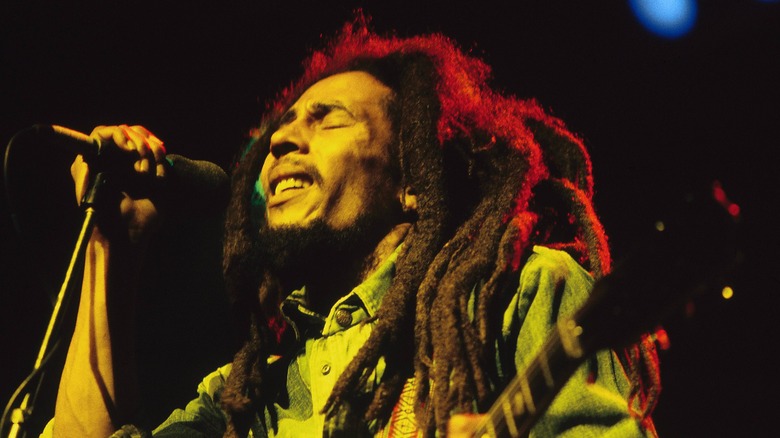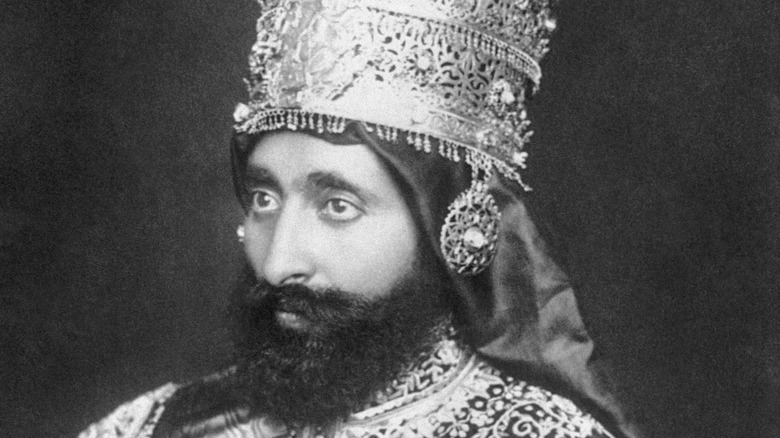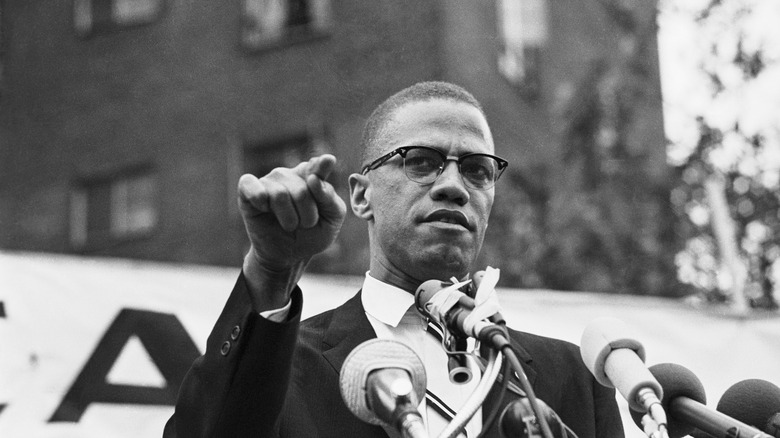The Inspiration Behind Bob Marley's Get Up, Stand Up
On the Wailers' 1973 album "Burnin'" Bob Marley and his co-writer Peter Tosh created a song that would become a global anthem for human rights. According to Professor Robert Tanner of Morehouse College, the song "was advocating everyone to make their voices heard, no matter their class in society," he told The Atlanta Constitution. But, like the best art, the lyrics aren't one-dimensional, leaving room for interpretation. For Bob Marley's wife Rita the song "was an encouragement to be strong, to be faithful," she wrote in 1995 (via "Every Little Thing Gonna Be Alright: The Bob Marley Reader").
The origins of the song seem to have many roots. According to Marley's then-girlfriend Esther Anderson, Marley wrote the song while touring Haiti in the early 1970s, per the Honolulu Star-Advertiser. At the time, Haitian dictator Jean-Claude "Baby Doc" Duvalier was in power, a reign marked by human rights abuses and poverty, per Britannica. Some say the song was influenced by Malcolm X's Civil Rights leadership. One thing is for certain, "Get up, Stand up," is also a song about Marley and Tosh's religion, Rastafari.
Emperor Haile Selassie
While "Get up, Stand up" has become a rallying cry for human rights, it is also a celebration of Rastafari, the Jamaican-born religion that both Bob Marley and Peter Tosh practiced. Many of the belief's adherents, Rastas, consider Emperor Haile Selassie, who was the Emperor of Ethiopia from 1930 to 1974, as the second coming of Christ, according to National Geographic and Britannica. The religion combines elements of Christianity, mysticism, and Pan-Africanism — a movement to unite people of African descent around the world, per the American Historical Association.
Ennis B. Edmonds, in his book "Rastafari: A Very Short Introduction," asserts that the song, as well as others by Bob Marley, reflects Marley's beliefs and "celebrates Haile Selassie as the great Black liberator" and critiques "social institutions of Western society as oppressive and alienating." The song was influenced by traditional chants used in Rastafari ceremonies called "groundings," according to Edmonds. Because the song is multilayered, it can be both a "devotional tune written to celebrate one's prophet" and "an anthem to unite and liberate," in the words of "Keep On Pushing: Black Power Music from Blues to Hip-hop."
Malcolm X
Yet another possible inspiration for the song was the writings of Malcolm X, the hugely important political activist, Muslim, and thinker of the 1960s. He advocated Pan-Africanism, tying the struggles of American Blacks with those of African nations, per Sage Journals. "It is easy to hear the themes of many of Malcolm's speeches in ... Bob Marley and Peter Tosh's 'Get up, Stand up,” Columbia University Professor Manning Marable wrote in Crisis Magazine in 2002. Bob Marley was also a Pan Africanist, according to "Keep On Pushing: Black Power Music from Blues to Hip-hop."
Peter Tosh, who co-wrote the song, was also strongly influenced by 1960s Civil Rights leaders, including Malcolm X, according to NPR. And "Get up, Stand up," is in line with this. "You should get up and stand up and be a Black man, be a man," Herbie Miller, a friend and manager of Tosh before Tosh's murder in 1987, told the news organization. "That was the point Peter was trying to make." After Tosh left the Wailers in 1973, he recorded his own version of "Get up, Stand up," on his second solo album, 1977's "Equal Rights," which continued the theme of Pan Africanism.


